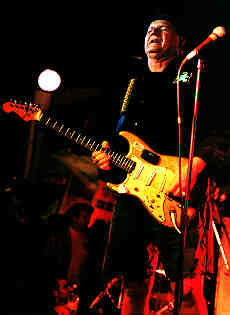by Tim McMahan
Dick Dale was
cranky. He’d been on the road, and sick since April 10 with dizzy spells, and just
the night before we talked via phone from the Woodbridge, N.J., Budget Motor Lodge, Dick
had six liters of saline pumped into a body that "looked like a damn dry-cleaning
rack." It’s what’s known as "suffering from exhaustion."
He’d had very little sleep, if any. He wasn’t in a good mood.
"Where are you calling from? Omaha. Well, no wonder you
don’t know what’s going on," Dale said, later adding, "You
shouldn’t even be writing this story if you haven’t heard me play live. You
can’t write with the passion you receive until you see a Dick Dale concert." I
didn’t know if I was stung more by his arrogance or because he was right.
Dick Dale talks in the undulating non-stop crescendo rhythms that
are a metaphor for his in-your-face guitar-playing style. He’s the kind of guy who
slips in and out of third-person singular. He’s called the "King of Surf
Guitar," a title he says he never paid attention to. "I really hated that
fucking thing," Dale quickly added. "It drove me crazy all these years. I became
stereotyped."
He’s best known these days as the guy who plays the trembling,
violent, middle-eastern-flavored epoch "Misirlou," the crash-and-burn guitar
roar that is launched at the beginning of Quentin Tarantino’s "Pulp
Fiction," right after "Honey Bunny" Amanda Plummer yells, "This is a
robbery." Oh yeah, now you remember.
Few of us know-nothing Omahans know that Dale had a huge career
before meeting Tarantino, making the Southern California scene in 1960 with Dick Dale and
the Del-tones.
(The Tarantino story, incidently, as told by Dale, talking at 100
miles an hour: "Quentin makes movies from the energy of songs. He said,
‘I’m one of your biggest fans.’ He said, ‘Misirlou is a masterpiece. I
would love to have your permission to make a movie that will be a masterpiece that will
complement the masterpiece of Misirlou.’ I knew when he did Reservoir Dogs and the
shit he had to go through that he was no bullshitter. I’m a very good judge of
character.")
Dale received the "surf king" tag after the release of the
single, "Let’s Go Trippin’" in 1961, a song that is considered by
critics to be the seedling of the surf music genre, later cultivated by the Beach Boys
(who Dale says he used to give $50 to open his shows), Jan and Dean and all the others who
sang pop-candy about bikinis and souped up cars. Surf music was faddish, and ultimately,
vacuous and boring -- just the opposite of Dick Dale’s music.
Anyone who’s heard "Misirlou" (released originally in
1961) or any of Dale’s recent releases (notably, "Tribal Thunder" or
"Unknown Territory,") know that his music is all about power and speed, rhythm
and noise.
"I don’t play pyrotechnic scales," Dale says. "I
play about frustration, patience, anger. Music is an extension of my soul. If you go to a
Dick Dale concert you’ll see skinheads, tatoos, androgenous people, tribes of all the
lands, college professors... That’s where typical musicians fail -- they try to show
off and play more technical to impress other musicians. But I’m playing for the
people who are working for $3.50 an hour, the carpenters, the ditch diggers, the
grass-roots people."
Dale says his shows are more than rock concerts, they’re
transcendental experiences. "I’m constantly being influenced by the soul
that’s directly in front of me," he says. "One guy said, ‘You’re
a living Shaman.’ He had steel pins through his nose and cheek and tongue, and he
came up to me and just held me and trembled. I said, ‘It’s okay, I know what
you’re trying to say.’"
Perhaps Dale misread the signs. Maybe pincushion man was merely
overcome by the intense noise level. If all reports are accurate, you would be
well-advised to bring a pair of industrial-strength earplugs to the Royal Grove May 4. The
common thread that runs through reviews of Dick Dale shows is the overpowering sound
levels, something that Dale prides himself on.
"I met Leo Fender, who is the guru of all amplifiers, and he
gave me a Stratocaster," Dale said. A left-hander, Dale plays with the strings upside
down. "When Leo saw that, he fell down laughing. He became a second father to
me."
Through the course of his early relationship with Fender, Dale says
he blew up more than 50 amplifiers, acting as sort of a walking test lab for Fender.
"Leo said, ‘How come you have to be so loud?’ In that
era, no one played with their amps above 5," Dale said. Finally he took Fender to see
one of his ballroom shows, where more than 4,000 listened. As a result, Fender created the
"Showman" amp for Dale, with more than 100 watts of power. "Dick Dale
became the father of Heavy metal," Dale says. "Dick Dale became the man who made
ears bleed."
(back to lazyeye band profiles)
Copyright © 1998 Tim McMahan. All rights reserved. |
|

|
|
Dick Dale at one of his many
gigs enters into a trance-like state while fronting his band. |

![]() webboard
interviews
webboard
interviews